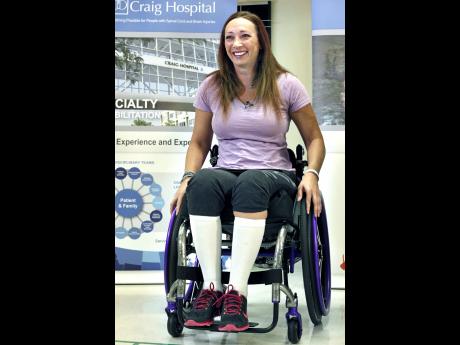Former swimmer adjusts to ATV injuries
PHOENIX (AP):
There were days, particularly right after her accident, when Amy Van Dyken-Rouen just curled up in a ball and cried.
Even now, 10 months since her spine was severed in an ATV crash, Van Dyken-Rouen has those moments when reality becomes a little too much to bear.
One of the most highly decorated swimmers in Olympic history, Van Dyken-Rouen had her world turned upside down after flying over the handlebars of an ATV and severing her spinal column.
In addition to the life-altering shock of paralysis and the complications that go with it, Van Dyken-Rouen found herself confronted with realities that come with a severe injury: Fighting with insurance companies, finding and paying for medical supplies like wheelchairs and shower chairs, all the little hassles of a suddenly new world she wasn't prepared for.
But no matter how down she might get, how hard her rehabilitation becomes, Van Dyken-Rouen keeps pushing forward with the tenacity that helped her win six Olympic gold medals in swimming.
"It's not an easy transition, but the thing I look at is I'm alive," she said. "There was a great possibility when I first got injured that I wasn't going to live to see this day. Take a moment, cry it out, then move on. That's how I can remain so positive."
Van Dyken-Rouen's celebrity and eternally optimistic viewpoint have made her a perfect advocate for people with spinal-cord injuries.
Advocate for the cause
Not long after the June 6, 2014 accident left her with no feeling below the waist, Van Dyken-Rouen became an inspiration for others with similar injuries.
At first, she offered hope and encouragement through social media. She later started Amy's Army, a part of the Amy Van Dyken Foundation that provides necessary medical supplies for people with spinal-cord injuries who can't afford them.
Van Dyken-Rouen's latest endeavour is serving as captain for Team Reeve, a community-driven fundraising arm of The Christopher & Dana Reeve Foundation.
The Reeve Foundation created the new position for Van Dyken-Rouen to amplify its grass-roots fundraising efforts to improve the quality of life and potentially find cures for people with spinal-cord injuries.
Van Dyken-Rouen is currently trying to recruit people to run in the New York City and Chicago marathons for Team Reeve, which raised $600,000 from various athletic events and local gatherings in 2014.
The role is a perfect fit for her.
When Superman actor Christopher Reeve was paralysed from a horse-riding accident in 1995, Van Dyken-Rouen admittedly knew very little about spinal-cord injuries.
As Reeve became an activist for people with disabilities and spoke openly about his life as a quadriplegic, Van Dyken-Rouen, like so many others, began to see people with spinal-cord injuries in a different light.
"He kind of made it more OK, I guess, for people to be in wheelchairs, in my mind," said Van Dyken-Rouen, who has started to regain movement in her hip flexors and quad muscles through rehabilitation.
And that's a legacy Van Dyken-Rouen wants to continue.
"You don't expect this to happen and you're hit with all this drama and trauma, you shouldn't have to deal with all of this stuff on top of trying to learn how to live," she said. "So many people helped me get my wheelchair and my shower chair that I needed to pay it forward. The way I see it, if you don't pay it forward, you're kind of a schmuck."
Stigma
The other aspect of Van Dyken-Rouen's activism is changing the public perception of people with spinal-cord injuries.
Van Dyken-Rouen remembers thinking before Reeve's injury that most people in wheelchairs were born that way and has noticed the stigma that sometimes comes from people who see her sitting in a chair.
It's something she wants to change.
"If you see someone in a wheelchair and your kid asks, 'Mommy, how did that person get in a wheelchair' don't shush them," Van Dyken-Rouen said. "Encourage them to ask because then it kind of opens up the conversation where it doesn't make people in wheelchairs feel like outsiders in the world. I want people to understand that just because you're in a wheelchair, you still have a life. You still have a great life and because you're in a wheelchair, it actually can open up more doors for you. I want people to see the hard work that goes into sitting in a wheelchair."

